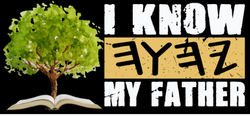Defying the Norm: Abraham's Bold Journey of Faith
Watch The Full Video Lesson Here:
Introduction:
Abraham’s story is not just an ancient biblical account—it’s a living testimony of what it means to trust Yahuwah completely, even when the world around you says otherwise. His life reminds us that faith often requires courage, boldness, and a willingness to break away from what is popular or socially accepted. As we explore his journey, we’ll uncover timeless lessons about resisting cultural pressures, listening to Yahuwah’s call, and standing strong in our beliefs.
Here are our favorite bible study tools. Here is the link:
The Call to Courage: Abraham's Early Life
Before he became the father of nations, Abraham—then known as Abram—was born into a world filled with idol worship. His father, Terah, was an idol-maker, deeply rooted in the traditions of a culture that honored false gods. By all expectations, Abram should have followed in his father’s footsteps, but something within him longed for truth.
Imagine a young Abram hearing stories of Noah, Shem, and the great flood—tales that hinted at a Creator far greater than carved statues of stone or wood. These stories planted seeds in his heart, sparking questions and stirring faith. Surrounded by a society obsessed with idols, Abram began to recognize the emptiness of worshiping man-made things. This was the first step in his courageous journey: choosing to seek Yahuwah rather than conform to the comfort of cultural norms.
Nimrod: The Fearful Power and Its Implications
In Abram’s time, the world was under the influence of Nimrod, a powerful and feared ruler. Nimrod’s reign was marked by pride, arrogance, and a determination to control others through fear. According to ancient accounts, wise men in Nimrod’s court noticed a rare star pattern the night Abram was born. They interpreted it as a sign that a child had been born who would one day challenge the king’s authority and change the course of history.
Threatened by this prophecy, Nimrod ordered Abram’s death—a shocking example of how far leaders will go to protect their power. This part of Abram’s story mirrors many situations we see today, where those in authority try to silence the truth to maintain control. It’s a reminder that standing for righteousness often puts us in direct opposition to the world’s systems.
Divine Protection: Growing Up Under Yahuwah’s Hand
When Nimrod sought Abram’s life, Terah was faced with a life-changing decision: obey the king or protect his son. Choosing courage over fear, Terah hid Abram in a cave, away from the king’s reach. There, Abram grew in safety, watched over by the divine protection of Yahuwah.
While in hiding, Abram was free from the direct influence of idolatry and had the space to learn, observe, and grow in his understanding of truth. This season of seclusion became a time of preparation. It shows us that Yahuwah can use even the most difficult situations to position us for our calling. Sometimes, the times we feel hidden or overlooked are the times He is shaping our character and strengthening our faith.
The Roots of Faith: Learning from the Past
Abram’s deep faith was not formed in isolation—it was nurtured by learning from the faithful who came before him. Through the stories and wisdom passed down from Noah, Shem, and other righteous men, Abram developed an unshakable belief in Yahuwah. He valued truth more than popularity and sought to understand Yahuwah’s ways above all else.
This reflects an important truth for us today: spiritual growth often comes through mentorship and godly relationships. Just as Abram learned from those who walked closely with Yahuwah, we too need people in our lives who will challenge us, guide us, and point us back to His Word.
Standing Firm in Faith: The Challenges and Triumphs
Abram’s journey of faith was not easy. Choosing to follow Yahuwah meant resisting the pull of the culture around him and risking ridicule, rejection, and even death. But he did not waver. His life teaches us that true faith often requires us to stand alone, holding to Yahuwah’s promises even when others doubt us.
In our world today, we face similar tests—peer pressure, societal expectations, and the temptation to compromise our beliefs for acceptance. Abram’s example reminds us to remain steadfast and not be “lukewarm” in our faith. Courageous faith means trusting Yahuwah’s plan, even when we cannot see the outcome.
Conclusion:
Abraham’s journey is more than a historical account—it’s a roadmap for living a life of courage, obedience, and trust in Yahuwah. His willingness to defy societal norms and hold firmly to his faith challenges us to examine our spiritual walk. Are we willing to stand for truth when it’s unpopular? Will we choose Yahuwah’s ways over the world’s ways?
By following Abraham’s example, we can develop a faith that is bold, unshakable, and pleasing to Yahuwah—a faith that not only transforms our lives but also leaves a lasting legacy for generations to come.

